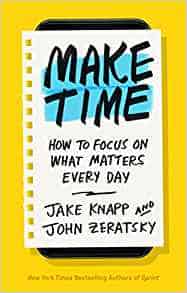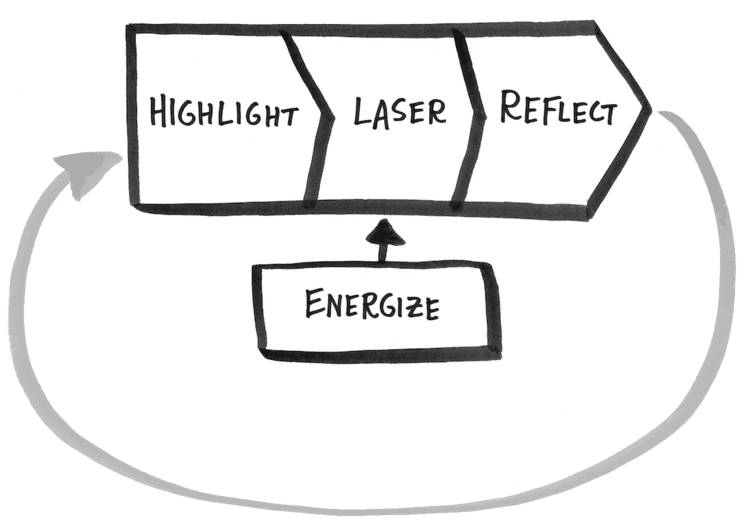Make Time

It may be a sign of my own insanity that I keep buying and reading productivity books. If they helped, I wouldn’t need to read another; if they don’t help, then I should have stopped reading them. But here I am again with another book, hoping it will make the difference.

The book is Make Time: How to Focus on What Matters Every Day. The attraction is that it’s written by Jake Knapp and John Zeratsky, authors of Sprint: How to Solve Big Problems and Test New Ideas in Just Five Days, a book that I enjoyed a couple of years back. The authors worked for Google Ventures, and are creative and effective communicators.
Make Time is written to help us with our busyness problem. It’s not really a productivity book, they say. It’s designed to help us create time for what matters.
Make Time is a framework for choosing what you want to focus on, building the energy to do it, and breaking the default cycle so that you can start being more intentional about the way you live your life. Even if you don’t completely control your own schedule—and few of us do—you absolutely can control your attention.
The Contents
Make Time argues that most of our time is spent by default. Two forces, the Busy Bandwagon (filling our time so we stay busy) and Infinity Pools (apps that allow us to scroll with no end), tend to shape our behavior. The key to making time is to override the defaults and set our own. It’s “a framework for choosing what you want to focus on, building the energy to do it, and breaking the default cycle so that you can start being more intentional about the way you live your life.”
The book focuses on four key practices: starting the day with a single high-priority goal (a highlight), energizing our mind by using our bodies, entering laser mode, and then reflecting.

When we repeat this process, we won’t be perfect. We will make time for what matters, though, and improve our ability to do what matters most.
Of course, it’s easier to talk about the process than to implement it. Make Time offers some 87 tactics to help us apply the framework. For instance: nix notifications, invent a deadline, and take a day off. We’re not meant to try them all; we’re meant to experiment and find what works for us.
Forget about perfection, the authors say. “The goal is not monastic vows but a workable and flexible set of habits.” When we practice this framework, our daily lives will change, and we’ll spend time aligned with what’s important to us.
What I Liked
Many books like this leave me feeling exhausted. I feel like I’ve been given another set of principles to apply in my already overwhelmed life. I also find them difficult to implement, which leaves me feeling like I’ve failed. In other words, I’d be better off ignoring them.
Make Time is different. I like the framework and how simple it is. I love that it helps us develop good habits while avoiding perfectionism. And I really like that they keep it fun.
The real test of a book like this is if it makes a difference. The answer is a qualified yes. I’ve been working on setting a daily highlight rather than a laundry list of tasks, and it really is helpful. Travel has made this more difficult lately, but I can see this single practice making a real difference in my life.
If you feel too busy and you’re tired of books that promise help but leave you feeling more frustrated than before, then you’ll like Make Time. I’ll be working at applying its lessons over the coming months.
More from Amazon.com






